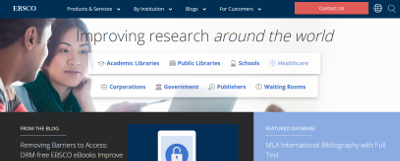EBSCO's MLA International Bibliography with Full Text | Reference eReviews
 MLA International Bibliography with Full Text
MLA International Bibliography with Full Text
Free trial available
By Gricel Dominguez
CONTENT The Modern Language Association’s (MLA) International Bibliography is the premiere collection of works on the study of language, literature, linguistics, rhetoric, composition, folklore, and film. EBSCO’s MLA International Bibliography with Full Text provides access to more than 1,000 journals from the early 20th century to the present. The database includes journal and book articles, monographs, translations, scholarly editions, dissertations, and more.
EBSCO also offers access to the MLA Directory of Periodicals and MLA Thesaurus. The MLA Directory contains information on publications, contacts, submission requirements, editorial policies, subscription terms, electronic availability, advertising, and statistics (circulation, number of articles submitted vs. published, and time from submission to decision and publication), and lists all periodicals and book series indexed in the MLA International Bibliography. By contrast, the MLA Thesaurus indexes thousands of searchable terms and personal names cited in the MLA International Bibliography.
USABILITY The resource relies on the standard EBSCO interface, with few bonus features. A menu at the top of the homepage allows users to conduct a new search, access the MLA Thesaurus or the MLA Directory of Periodicals, or choose between one of the two MLA indexes. Users can also sign in to their personal EBSCO account, go to the saved items folder, set display and sharing preferences, and choose their preferred language, all within reach of a help page.
Users can conduct basic and advanced searches of both collections simultaneously, or they can select their preferred collection. Under basic search, various modes are available, including Boolean and “find all my search terms.”
Researchers can conduct advanced searches using fields such as “all text,” “author,” “title,” “subject terms,” “source,” “abstract,” “ISSN,” and “ISBN.” Three search rows are provided by default, along with the standard Boolean operators, but users can add up to nine additional fields to their search for a total of 12.
Further limited search options vary by collection. For example, results from the MLA Directory of Periodicals can be limited by “publication type,” “country,” “language,” and more. Users can also restrict results to journals that are actively indexed or accept advertising, among other factors.
Users searching only the MLA International Bibliography with Full Text have the option to filter by “publication type” (book, journal article, website, etc.), “language,” “genre” (novel, drama, poetry, etc.), and “period”; they can also opt to exclude dissertations and narrow results to peer-reviewed journals, electronic publications, and works with references available. The publication type and genre options are detailed, making this a particularly useful tool.
Conducting a keyword search produces results across various document categories. Icons identify the source type (books, articles, dissertations, etc.). Publication information is listed beneath each title, along with a list of related subjects. Images and full-text PDF are displayed where relevant.
Users can add titles to their results folder by clicking on the folder icon to the right of the entry, or mouse over the magnifying glass icon to preview additional information. They can also sort results by relevance and/or date, set display options, and find sharing tools via the “share” menu provided at the top of the search results page. Sharing options include folder sharing, email alerts, RSS feeds, and a search permalink.
Clicking on an entry offers a more detailed record, including author affiliation, ISBN, subject terms, and more.
The MLA Thesaurus provides an additional layer of control and browsability via an indexed listing of names and terms. Users can limit results to “term begins with” or “term contains” or list them by relevance. For example, results for a “term begins with” search for “structuralism” includes structuralism, structuralist approach, structuralist critics, and more. Several of the results further invite users to “explode” the search to broader, narrower, and related terms. Users familiar with the topic they’re researching will have a better experience.
The “names as subjects” index, found on the main menu, performs a similar function, though this is limited to titles of works and personal names.
In addition, the MLA Directory of Periodicals provides publication and submission information on more than 6,000 journals and book series, making the archive optimal for scholars and students submitting work for publication and for librarians identifying materials for research and curriculum support. Though not a research tool per se, the directory facilitates scholarship and publication, as users can search by “title,” “subject & description,” or “match any words.”
MLA International Bibliography is an advanced resource that presumes some knowledge of the subject, if not greater expertise. The thesaurus and the “names as subjects” search page are somewhat clunky and not particularly user-friendly. The Directory of Periodicals is easy to browse, while the ability to conduct a subject search in lieu of a title search makes it simple to find relevant publications based on interest and subject area.
PRICING Cost for academic institutions is based on a variety of factors including but not limited to FTE, existing EBSCO databases, consortium agreements and/or buying groups. It’s best to contact EBSCO for a customized quotation, as pricing is subject to change based on royalty requirements and other contingencies.
VERDICT With coverage dating back to the 1920s, the MLA International Bibliography is the go-to resource for research in literature, linguistics, and language, making this database essential for institutions that support academic programs in these areas.
Gricel Dominguez is a Librarian at Florida International University Library, Miami
RELATED
ALREADY A SUBSCRIBER? LOG IN
We are currently offering this content for free. Sign up now to activate your personal profile, where you can save articles for future viewing









Add Comment :-
Comment Policy:
Comment should not be empty !!!